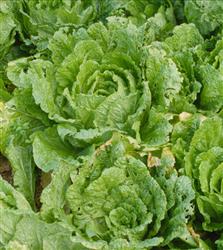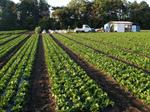Learn to Grow Vegetables Organically using Sustainable Techniques
 A growing interest in more environmentally sustainable gardening methods offers the chance to provide the general public the quickest, safest and most enjoyable organic garden practices. This course will lead you through these practices and guide you to develop and maintain your plot, large or small.
A growing interest in more environmentally sustainable gardening methods offers the chance to provide the general public the quickest, safest and most enjoyable organic garden practices. This course will lead you through these practices and guide you to develop and maintain your plot, large or small.
COURSE STRUCTURE
There are 12 lessons as follows:
- Introduction
- Cultivation and Planting
- Soils and Nutrition
- Soil Management
- Review of Major Vegetable Varieties
- Pests and Disease
- Seed
- Greenhouse Growing
- Lesser Grown Varieties and Herbs
- Irrigation
- Mulching
- Harvesting and Marketing
Each lesson culminates in an assignment which is submitted to the school, marked by the school's tutors and returned to you with any relevant suggestions, comments, and if necessary, extra reading.
AIMS
- Discuss general horticulture and plant taxonomy principles
- Describe a range of cultivation and planting techniques
- Explain soil properties, and their relationship to organic plant production
- Diagnose basic soil nutrient deficiencies
- Discus major and minor commercial vegetable varieties
- Describe a variety of pest and disease management principles
- Explain the use of seed in commercial organic agriculture, including storage, viability, germination, genetic purity, and hybridisation
- Discuss the principles of greenhouse growing
- Describe a variety of irrigation methods suitable for organic vegetable production
- Explain organic weed control methods
- Explain issues relating to harvesting and marketing of vegetables
Scope of Organics
Definitions of what is and isn't 'organic' are also extremely varied. Some of the most important features of organic production, as recognised by the International Federation of Organic Agriculture Movements (IFOAM), include:
-
Promoting existing biological cycles, from micro-organisms in the soil, to the plants and animals living on the soil.
-
Maintaining the environmental resources locally, using them carefully and efficiently and re-using materials as much as possible.
-
Not relying heavily on external resources on a continuous basis.
-
Minimising any pollution both on-site and leaving the site.
-
Maintaining the genetic diversity of the area.
WHAT YOU WILL DO
Here are just some of the things you will be doing:
- Compile reference lists of vegetable varieties, industry contacts, organic fertilisers and pest control products, etc.
- Evaluate the merits and deficiencies of agricultural equipment and products
- Build a no-dig garden and monitor its progress
- Classify soils
- Evaluate the role of soil organisms
- Identify nutrient deficiencies such as nitrogen deficiency
- Build composts
- Evaluate seed sources and plant varieties
- Perform sowing and germination trials
- Evaluate the merits and deficiencies of greenhouse growing
- Evaluate the principles of irrigation
- Perform mulching trials
- Evaluate pricing, packaging and presentation of retail vegetables
Duration: 100 hours
 What is Organic Growing all about?
What is Organic Growing all about?
Organic gardening and farming has been given a variety of names over the years - biological farming, sustainable agriculture, alternative agriculture, to name a few. Definitions of what is and isn't 'organic' are also extremely varied. Some of the most important features of organic production, as recognised by the International Federation of Organic Agriculture Movements (IFOAM), include:
-
Promoting existing biological cycles, from micro-organisms in the soil, to the plants and animals living on the soil.
-
Maintaining the environmental resources locally, using them carefully and efficiently and re-using materials as much as possible.
-
Not relying heavily on external resources on a continuous basis.
-
Minimising any pollution both on-site and leaving the site.
-
Maintaining the genetic diversity of the area.
Practices which are typical for organic systems are composting, inter cropping, crop rotation, fallowing, mechanical, hand weeding or heat-based weed control, green manure crops and the use of legumes to increase soil fertility. Pests and diseases are tackled with environmentally acceptable, sprays that have little environmental impact and biological controls (eg. predatory mites).
Organic gardeners should avoid the use of inorganic (soluble) fertilisers, super-phosphate for example should not be used because it contains sulphuric acid, rock phosphate however is the acceptable alternative. Synthetic chemical herbicides, growth hormones and pesticides should also be avoided.
One of the foundations of organic gardening and farming, linking many other principles together, is composting. By combining different materials, balancing carbon and nitrogen levels, coarse and fine ingredients, bacteria and worms act to break down the waste products. Composting produces a valuable fertiliser that can be returned to improve the soil. Natural biological cycles are promoted, 'wastes' are re-used and the need for external supplies of fertiliser are reduced or cut altogether.
Developing Biodiversity is a Useful Way to Develop Farm or Garden health.
Healthy ecosystems rely on growing as many different species of plants as you possibly can, in order for your garden to naturally resist and control pest invasions. Biodiversity (as opposed to monoculture, which relies on chemicals to keep plants healthy) attracts more insects (including beneficial insects) to your garden. It is these insects that can help you to keep your other plants healthy and at the same time they can help you to create an practical and productive farm or garden.
Planting carefully selected species can help achieve a healthy garden in the follow ways:
- Plants provide pollinators (good insects) with nectar and the foliage provides them with shelter. It's common for as much as 70% of farm produce to rely on pollination of crops by insects. When insects are given both food and shelter, they tend to stay and lay their eggs - this means that means your garden will have constant population replacement of these beneficial insects.
- Some herbs have also been proven to repel insects (garlic and chives being just two).
- Their scent can confuse pests (so it is a great idea to grow them scattered throughout your garden and vegetable garden).
- Plants protect the ground surface from erosion. Leaves stop rain splashing straight onto soil, and roots hold the soil together when water washes over it.
- Whilst beneficial insects such as hoverflies and lacewings and some parasitic wasps feed on nectar only, their progeny are meat - eaters that hunt out and consume insect pests. Other insects hunt pests in both their adult and juvenile phases including ladybirds, spiders, some beetles and so on.
WHY STUDY THIS COURSE?
- This course is a great starting point for anyone wanting to start out in this industry.
- Study this course if you are thinking of setting up a commercial organic vegetable growing farm.
- This course will give you all the fundamentals needed to confidently move ahead in this industry.
- If you have a property and are looking to start out in organics, understand the transitioning process.
- Know what is required to grow and sell your produce as 'organically certified'.
- Learn sustainable farming techniques that protect the soil, the environment and our health.
- Learn from tutors with years of knowledge and experience.